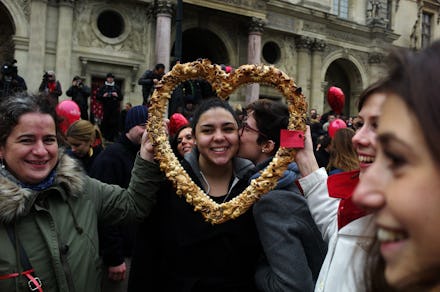Sweet Ways People Across the World Celebrate Valentine's Day

Love is a universal thing, but it sure doesn't look the same from country to country. Over decades, tradition and commercialization have fused together — creating unique cupid traditions across the world. With the same intention of showing love and affection, communities are celebrating the holiday in unique and sometimes surprisings ways. Though the holiday has met a fair share of controversy in several places around the world, the Hallmark holiday persists.
1. France
"Saint Valentin" or Valentine's Day in France is celebrated in pretty much the same was as in other western countries. Saint Valentine's story was not a cheerful one. After performing weddings of soldiers who were forbidden to marry under a Christian service, the popular saint was jailed and then killed. According to legend, before his execution he wrote a letter to his jailer's daughter who he had healed and signed it "Your Valentine." In 1400 France, princess Isabel of Bavaria apparently created a "High Court of Love" on the day remembering Saint Valentin.
2. Japan
In Japan, Cupid was born of capitalism. The company Morozoff Ltd started a campaign for giving chocolate to lovers in the 1950s. Quite fittingly, the tradition goes that the initial Valentine's Day burden falls on women. Women are tasked with giving chocolate to men, specifically their male coworkers.
But men are then expected to return gifts that are more valuable. Strongly rooted in capitalism, this is no surprise. If gifts are exchanged, a date may follow. In Japan, a romantic "date night" associated with Valentine's Day is surprisingly Christmas Eve.
3. Finland and Estonia
Both Finland and Estonia have a more platonic version of the holiday. In Finland, Valentine's Day is called Ystävänpäivä and in Estonia ti's called sõbrapäev, both translate to "Friend's Day." True to its title, the day is more about remembering all of your friends, not just loved ones. Can't we all live there? But alas, love is not lost in these two European countries. In Estonia, single people can take a ride on a"love bus" where they can meet other people in search of love.
4. China
In recent years, February 14th has started to become a Hallmark holiday in China too. Speciality chocolates, fancy dinners and flowers are the gifts of choice. But while both men and women make special gestures for their loved one, data shows that women put more effort into the holiday. While Cupid's commercialization is growing in China, the country also has a more traditional holiday related to affection.
A once-traditional holiday celebrating loyalty and individual skill, the Qixi Festival in China has become the closest thing to a national Valentine's Day. The festival originated from an age old tale of two lovers, Zhinü and Niulang, who were the weaver maid and the cowherd, respectively. It in August (the seventh day of seventh lunar month).
The popularity of the festival has been on the decline in recent years, prompting businesses to spruce up interest. Many stores will sell chocolates, flowers and small gifts around the festival. While many enjoy celebrating the holiday, others see it as mere commercialization of a Chinese tradition.
5. Israel
The Jewish tradition of Tu B'av has been re-purposed in modern times as the Israeli version of Valentine's Day. Celebrated on the 15th day of the month Av (usually in late August), many Israelis use the day to gift romantic gifts, pronounce their love or even propose marriage.
6. South Korea
In South Korea, like Japan, women give chocolate to men on February 14. And men give non-chocolate candy to women on March 14, also known as White Day. But what if you don’t get a gift? South Korea has more realistic twist on the holiday with its April 14th "Black Day." If you did not receive a gift in return, singles are supposed to go Korean restaurants to eat black noodles and lament their lack of love.